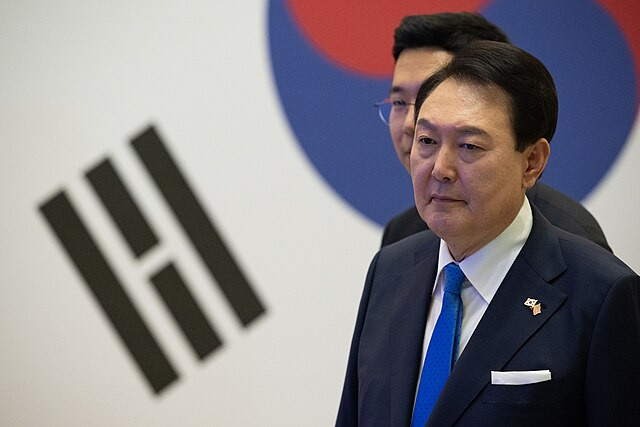South Korea's political turmoil deepened on Friday as investigators suspended their attempt to detain impeached President Yoon Suk Yeol after an hours-long standoff at his residence in Seoul. Thousands of Yoon's supporters gathered outside his home, forming a human barricade and creating an atmosphere of chaos that ultimately forced the authorities to withdraw.
The Corruption Investigation Office for High-ranking Officials (CIO) confirmed that a team of 80 police officers and investigators entered the presidential compound in the early hours of Friday. They were met with resistance from Yoon's security detail, bolstered by 200 soldiers and an increasingly defiant crowd. The CIO stated that it suspended the operation due to "concern for the safety of on-site personnel caused by the resistance," according to Yonhap News Agency.
The arrest warrant, issued on December 30, marks the first time in South Korea's history that such action has been taken against a sitting president. It stems from Yoon's declaration of martial law on December 3, a move he justified as necessary to address threats from opposition lawmakers and North Korea. The declaration triggered immediate backlash, with the National Assembly voting to rescind it just six hours later. This set the stage for Yoon's impeachment, which passed with an overwhelming 204-85 vote on December 14, suspending him from his presidential duties.
Yoon has refused to cooperate with investigators, ignoring three summonses to appear for questioning. His defiance has drawn sharp criticism from the CIO, which expressed "deep regret" over what it described as the former president's refusal to comply with legal procedures. Despite the suspension of the arrest attempt, the warrant remains valid until January 6, leaving open the possibility of another confrontation.
The scene outside Yoon's residence was emblematic of South Korea's political polarization. Over 1,000 supporters gathered, waving Korean and American flags and holding signs with slogans such as "Stop the Steal." Many echoed Yoon's claims of election fraud and opposition conspiracies, accusing left-leaning forces of orchestrating his impeachment. Some supporters went as far as to label the arrest attempt "treason," while others accused the CIO of operating outside the bounds of the law. Counter-protesters also rallied nearby, demanding Yoon's arrest and shouting, "Arrest, arrest, arrest!"
Yoon's legal team has filed objections to the arrest warrant, describing it as "illegal and invalid." Interim leader of Yoon's People Power Party, Kwon Young-Se, accused the CIO of "judge shopping" to secure the warrant and criticized the agency for undermining the rule of law. "I can't help but feel terrible about the disappearance of the rule of law in the Republic of Korea," Kwon said during a press briefing.
The political fallout from Yoon's martial law declaration has been far-reaching. The National Assembly has also impeached Prime Minister Han Duck-soo, leaving Finance Minister Choi Sang-mok as the acting president. Yoon's declaration has revived memories of South Korea's authoritarian past, with reports alleging that he ordered soldiers to use firearms to enforce the martial law. Lawmakers in the National Assembly reportedly barricaded themselves to block the declaration, using furniture to prevent troops from entering the chamber.
As Yoon's impeachment trial approaches, the stakes are high. The Constitutional Court is set to begin proceedings on January 14, a process that could take up to six months. The trial will determine whether Yoon is permanently removed from office or reinstated. If convicted, he faces potential life imprisonment or even the death penalty for charges of insurrection and abuse of power.
The CIO has urged acting President Choi Sang-mok to ensure compliance with legal procedures, signaling that another attempt to execute the warrant could occur before it expires. Yoon, however, remains defiant. In a letter to his supporters, he vowed to "fight to the end" for the country, reinforcing his position as a polarizing figure in South Korean politics.






